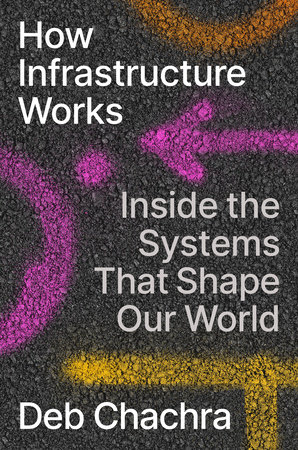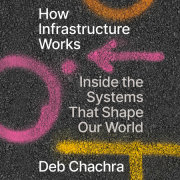Praise for How Infrastructure Works:
“Essential. . . . a passionate argument for the political necessity of functioning infrastructure.” —Annalee Newitz, The Washington Post
"This book articulates something of a philosophy of infrastructure: both a convincing call for us to think harder about these systems and a road map for how we might do so productively. . . . Chachra’s vision is positive, even galvanizing." —The Atlantic
“Insightful. . . . Written in a distinctive style that is both conversational and erudite, this is an accessible and enjoyable account. Readers will be engrossed.” —Publishers Weekly (starred review)
“Superbly rendered. . . . A rare book on engineering and its economics that will satisfy general readers.” —Kirkus (starred review)
"How Infrastructure Works. . . will change how you view train departure boards, light switches and spray-painted symbols on the pavement. As Chachra walks readers through familiar landscapes of networks, systems and technologies, she makes the systems mysterious and fascinating once more." —Nature
“As the world deals with climate instability, Chachra offers a vision of inclusive design that reimagines what communities can become. Writing with enthusiasm and clarity, Chachra explains complex systems and human dynamics in this approachable, informative study of the world around us.” —Booklist
“The urgent problems of the modern era have instilled in so many of us a deep craving to more clearly see the systems that define our lives, to better understand when and why they fail, and to regain agency over a world that can seem too complex to understand much less affect. Fortunately, Deb Chachra has written exactly the book we needed. Revelatory, superbly written, and pulsing with wisdom and humanity, How Infrastructure Works is a masterpiece.” —Ed Yong, author of An Immense World and I Contain Multitudes
“A wonderful, wide-ranging narrative addressing the technical, social, personal, historical, and political aspects of the often-disregarded, invisible systems that support us. Forged of a huge heart and vast expertise, it shines with fierce humanity.” —Helen Macdonald, author of Vesper Flights and H Is for Hawk
“How Infrastructure Works gives you x-ray vision into our built environment. It's also a ton of fun to read; Chachra is a gifted stylist and a first-rate intellectual guide.” —Clive Thompson, author of Coders: The Making of a New Tribe and the Remaking of the World
“Deb Chachra provides a helpful and hopeful guide to understanding the hidden systems that keep our everyday lives going. You won’t see the world the same after reading this book!” —Austin Kleon, author of Steal Like an Artist
“Deb Chachra is the perfect guide not just to how infrastructure works but also how it feels. This book is just like the power plants it describes: a precise machine, a fountain of energy.” —Robin Sloan, author of Sourdough and Mr. Penumbra’s 24-Hour Bookstore
“A hopeful, lyrical—even beautiful—hymn to the systems of mutual aid we embed in our material world, from sewers to roads to the power grid.” —Cory Doctorow
"An extraordinary book that shows just how much the vast engineering structures that we rely on every day are shaped by political and social forces. It’s a passionate plea for people to understand that engineering is deeply human." —Mark Miodownik, author of Stuff Matters






